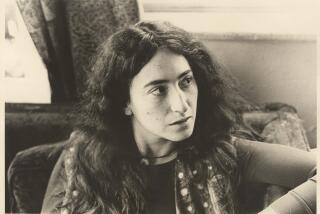Prose of Innocence and Experience
- Share via
Nino Ricci’s “Where She Has Gone” is the final installment in a trilogy of novels that have followed Vittorio Innocente from his birth in the Neapolitan hamlet of Valle del Sole to his coming of age in Toronto. Along the way, he gained a half-sister (care of an adulterous union) and lost a mother (via a mid-Atlantic childbirth), reunited with a father who had already migrated to Canada, lost the half-sister to foster parents and ran away to Africa. And yet his father’s suicide proves that even Kenya isn’t far enough.
Now Vittorio, or Victor as his New World friends call him, is back in Canada, and it is his half-sister, Rita, who has finally come of age. She has entered a university. But more significantly, she has reentered Victor’s orbit at a time when, struggling with his own academic and emotional goals, he needs someone to protect. “She looked indistinguishable from the young women I’d passed in the halls, fresh-faced and blithe, her hair pulled back in a ponytail to set off the red of her lips, the blue of her eyes, like tiny gifts.”
Rita brings her homework over to his apartment; Victor takes her to the movies; they go for a ride in his father’s car to Niagara Falls. And with the spray gusting into their faces, their semi-sibling relationship threatens to go over the edge.
“I remembered a picture in my grade-one reader,” Victor thinks, “of a young boy and girl, brother and sister, making their way along a rotting footbridge over a rocky chasm, and had the same sense of beginning a dangerous crossing. In the picture, a guardian angel had hovered over the two; but still the outcome had seemed uncertain, a matter of one careful step after another.”
The rotting footbridge takes Victor and Rita separately back to the Valle del Sole of Victor’s birth and Rita’s scandalous conception. It’s a journey of true innocents who discover, as many have before them, that memory is a slippery fellow, that “there are always these moments that can’t be accounted for . . . as if the story of life, to verge toward the truth, should always imply at every instant the dozens of other versions of things that must be suppressed to make way for a single one.”
Ricci moves the plot along with a similarly unobjectionable philosophy and prose, never frothing into the sudsy end of the operatic spectrum. He knows how to point at details, how to draw a scene to a close. One expects a great deal from such a chef and from a stew with such rich ingredients--half-siblings, dual citizens, even World War II. And yet never before has incest tasted so bland.
Perhaps the fault lies in the specific cast of the ingredients. Vittorio, Rita and their Canadian and Italian friends come off as such a confederacy of nebbishes, with needs so circumscribed that little seems to matter. Even the frequent hints at their subterranean secrets fail to excite the palate above tofu on the Richter scale.
The first novel of the trilogy won Canada’s Governor General’s Award for fiction. This third has been nominated for another prize. Which only goes to show that, in matters of taste, like Vittorio Innocente, we can all be innocent victors.
More to Read
Sign up for our Book Club newsletter
Get the latest news, events and more from the Los Angeles Times Book Club, and help us get L.A. reading and talking.
You may occasionally receive promotional content from the Los Angeles Times.










